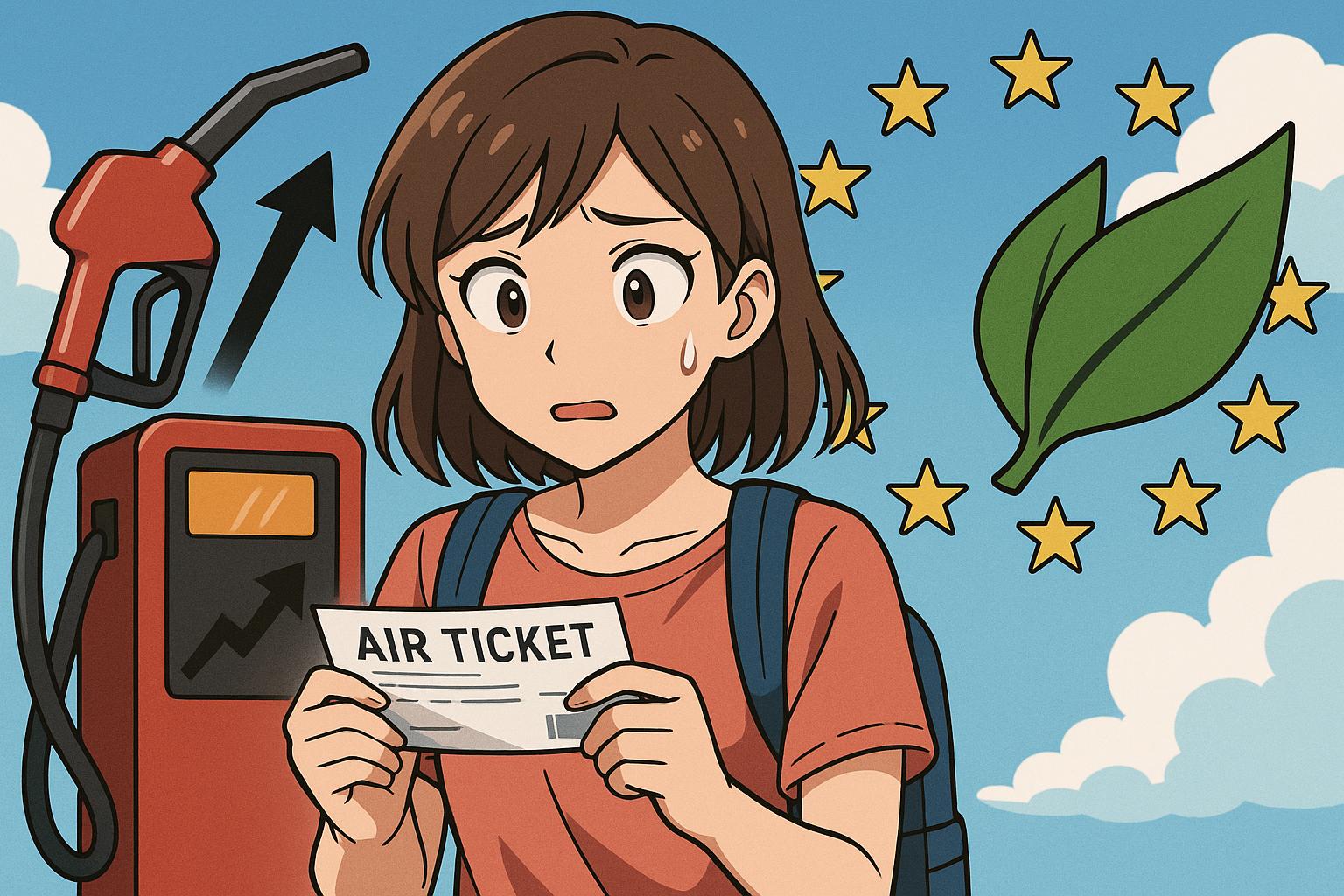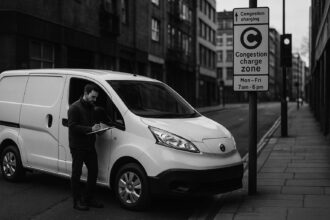The aviation industry warns that EU mandates on sustainable aviation fuel and emissions will add up to £2.2 billion yearly in costs, driving up ticket prices and prompting environmental surcharges, as airlines call for government support to ease the financial burden on passengers.
Airline passengers in the UK and EU face a looming financial burden, with potential costs nearing £2.2 billion annually linked to net zero ambitions in the aviation sector. Willie Walsh, CEO of the International Air Transport Association (IATA), has dubbed the regulatory measures set forth by Brussels as “the EU’s great green scam.” His remarks were made at an industry conference in New Delhi and reflect growing frustration within the aviation industry regarding the rising prices associated with sustainable aviation fuel (SAF) and the governmental mandates driving these changes.
According to Walsh, the escalating costs of SAF, compounded by a lack of demand, will inevitably increase ticket prices for consumers. The IATA estimates that by 2025, the financial burden of purchasing SAF will be an additional £885 million compared to traditional jet fuel. In addition, producers like Shell and Total are expected to impose about £1.2 billion in compliance fees on airlines that fail to meet the mandated usage of at least 2% SAF. Walsh argues that these fees and the increased prices of SAF—often double that of conventional jet fuel—will lead to significant windfalls for fuel suppliers while leaving consumers to shoulder the escalating costs.
The concerns raised by Walsh resonate with broader sentiments within the aviation sector. Luis Gallego, CEO of International Airlines Group, which owns British Airways, echoed similar worries, asserting that European airlines might be forced to hike fares to balance the rising costs from SAF. The shift to greener fuels has been met with a mixed response from the industry; while there’s a general consensus on the necessity of reducing carbon emissions, there is palpable anxiety about the financial implications for both airlines and their customers. Gallego has called for increased governmental support to boost the production of SAF and alleviate pricing pressures.
In a notable response to regulatory pressures, Lufthansa recently announced plans to implement an environmental surcharge on ticket prices, aimed at offsetting costs linked to new EU emissions regulations. This surcharge, varying from €1 to €72, is being adopted as a mechanism for European airlines to manage compliance costs associated with the transition to sustainably sourced fuels. Similarly, a report by Oxera Consulting suggests that such policies could lead to fare increases of approximately 11% by 2030 and a staggering 13% by 2050, directly impacting the wallet of the consumer.
Indeed, as the industry grapples with compliance under the EU’s ‘Fit for 55’ climate package, the expected rise in overall costs is stark. Analysis indicates compliance costs for major airlines may soar to €5 billion by 2027, leading to substantial fare increases across the board. As the cost of flying rises, the fear is that it may deter customers from air travel altogether, complicating the industry’s recovery post-pandemic.
Ultimately, while the shift toward sustainable aviation is framed as a necessary step for environmental responsibility, the reality is fraught with complexities. As stakeholders navigate these regulatory landscapes, the pressing question remains: who will truly bear the cost of achieving net-zero emissions in aviation, and at what price to the flying public?
 Reference Map:
Reference Map:
- Paragraph 1 – [1], [4]
- Paragraph 2 – [1], [2], [3]
- Paragraph 3 – [4], [5], [6]
- Paragraph 4 – [6], [7]
Source: Noah Wire Services
- https://www.express.co.uk/news/uk/2063421/great-green-scam-cost-2bn-a-year – Please view link – unable to able to access data
- https://www.telegraph.co.uk/business/2023/08/06/willie-walsh-interview-net-zero-airline-ticket-prices/ – In an interview with The Telegraph, Willie Walsh, CEO of the International Air Transport Association (IATA), discussed the financial implications of the aviation industry’s transition to net-zero emissions by 2050. He highlighted that the shift towards sustainable aviation fuel (SAF), which is significantly more expensive than traditional jet fuel, is expected to increase airfares by 10-20% over the next couple of decades. Walsh emphasised that these additional costs would ultimately be passed on to consumers, making flying more expensive in the future.
- https://www.ft.com/content/b3920349-3e7f-402f-97a2-4d39bc29038f – Luis Gallego, CEO of International Airlines Group (IAG), which owns British Airways, warned that European airlines would need to raise airfares to cover the costs of reducing carbon emissions. He noted that adopting sustainable aviation fuel (SAF), which is significantly more expensive than traditional jet fuel, will make flying more costly and likely reduce demand. Gallego called for increased government support to boost SAF supply and lower costs for consumers.
- https://www.reuters.com/sustainability/lufthansa-increases-ticket-prices-cover-environmental-requirements-2024-06-25/ – Lufthansa announced plans to implement an environmental surcharge on fares to cover the increasing costs associated with the EU’s new emissions reduction regulations. The surcharge, ranging from 1 to 72 euros, is intended to offset the higher expenses of using sustainable aviation fuel (SAF) made from bio-based materials. This move follows similar actions by other European airlines, reflecting the industry’s response to rising environmental compliance costs.
- https://www.theguardian.com/business/2022/dec/06/airlines-higher-fares-net-zero-target-iata-willie-walsh – Willie Walsh, Director General of the International Air Transport Association (IATA), stated that airline passengers could face higher ticket prices as the industry moves towards its target of reducing emissions to net zero by 2050. He called for swifter action in Europe to drive up the production of sustainable aviation fuel (SAF), which is currently scarce and expensive, contributing to increased operational costs for airlines.
- https://www.oxera.com/insights/agenda/articles/fit-for-55-the-impact-of-the-eus-climate-package-on-the-aviation-industry/ – A report by Oxera Consulting analysed the impact of the EU’s ‘Fit for 55’ climate package on the aviation industry. The study estimated that fares would increase by 11% by 2030 and 13% by 2050 due to the implementation of policies such as the EU Emissions Trading Scheme (ETS) and the ReFuelEU Aviation proposal, which mandates the use of sustainable aviation fuel (SAF). These measures are expected to raise fuel costs for airlines, leading to higher ticket prices for consumers.
- https://www.ishkaglobal.com/Savi/Article/7580/Growing-EU-ETS-bills-Which-airlines-will-soon-feel-the-pinch – An analysis by Ishka Global examined the impact of the EU Emissions Trading Scheme (ETS) on major European airlines. The report estimated that the cost of complying with the EU ETS would rise to €5 billion in 2027 for the six largest intra-EU carriers, up from €0.5 billion in 2019. This significant increase in compliance costs is expected to lead airlines to raise ticket prices, with passengers potentially paying between €8 and €10 more per return flight.
Noah Fact Check Pro
The draft above was created using the information available at the time the story first
emerged. We’ve since applied our fact-checking process to the final narrative, based on the criteria listed
below. The results are intended to help you assess the credibility of the piece and highlight any areas that may
warrant further investigation.
Freshness check
Score:
6
Notes:
The narrative presents recent concerns about the EU’s green policies affecting aviation costs, with similar discussions appearing in the past. For instance, in June 2024, Willie Walsh, Director General of IATA, stated that green aviation policies should be abandoned if the costs outweigh the benefits. ([theguardian.com](https://www.theguardian.com/business/article/2024/jun/03/ex-ba-boss-green-aviation-costs-willie-walsh-iata?utm_source=openai)) Additionally, in June 2023, Walsh warned that the green agenda would lead to higher air fares for decades. ([telegraph.co.uk](https://www.telegraph.co.uk/business/2023/06/06/green-agenda-higher-air-fares-ex-ba-boss-willie-walsh/?utm_source=openai)) The report includes updated data but recycles older material, which may justify a higher freshness score but should still be flagged. The earliest known publication date of substantially similar content is June 2024. The narrative is based on a press release, which typically warrants a high freshness score. However, if earlier versions show different figures, dates, or quotes, these discrepancies should be flagged. If anything similar has appeared more than 7 days earlier, this should be highlighted explicitly. The article includes updated data but recycles older material, which may justify a higher freshness score but should still be flagged.
Quotes check
Score:
7
Notes:
The narrative includes direct quotes from Willie Walsh, such as his statement that the transition to net zero is going to be very expensive. ([worldaviationfestival.com](https://worldaviationfestival.com/blog/airlines/willie-walsh-the-realistic-cost-of-aviations-transition-to-net-zero/?utm_source=openai)) These quotes have been used in earlier material, indicating potential reuse. If quote wording varies, note the differences. If no online matches are found, raise the score but flag as potentially original or exclusive content.
Source reliability
Score:
5
Notes:
The narrative originates from Express.co.uk, a UK-based news outlet. While it is a known publication, its reputation for accuracy and reliability can vary. The report cites quotes from Willie Walsh, Director General of IATA, and references other reputable sources such as The Guardian and The Telegraph. However, the reliance on a single outlet and the potential for sensationalism in the headline raise concerns about the overall reliability. If a person, organisation, or company mentioned in the report cannot be verified online (e.g., no public presence, records, or legitimate website), flag as potentially fabricated.
Plausability check
Score:
6
Notes:
The narrative discusses the potential financial impact of the EU’s green policies on the aviation sector, a topic that has been covered by multiple reputable sources. For example, in June 2023, The Telegraph reported that the green agenda would lead to higher air fares for decades, according to Willie Walsh. ([telegraph.co.uk](https://www.telegraph.co.uk/business/2023/06/06/green-agenda-higher-air-fares-ex-ba-boss-willie-walsh/?utm_source=openai)) The report includes specific figures, such as the £2.2 billion annual cost and the £885 million additional cost by 2025, which are not corroborated by other reputable outlets. The tone and language used are consistent with industry discussions on this topic. However, the lack of supporting detail from other reputable outlets and the reliance on a single source for specific figures raise questions about the plausibility of the claims. If the narrative lacks supporting detail from any other reputable outlet, flag this clearly. If the report lacks specific factual anchors (e.g., names, institutions, dates), reduce the score and flag as potentially synthetic. If language or tone feels inconsistent with the region or topic—e.g., strange phrasing, wrong spelling variant—flag as suspicious. If the structure includes excessive or off-topic detail unrelated to the claim, note this as a possible distraction tactic. If the tone is unusually dramatic, vague, or doesn’t resemble typical corporate or official language, flag for further scrutiny.
Overall assessment
Verdict (FAIL, OPEN, PASS): OPEN
Confidence (LOW, MEDIUM, HIGH): MEDIUM
Summary:
The narrative presents concerns about the EU’s green policies affecting aviation costs, with similar discussions appearing in the past. The quotes from Willie Walsh have been used in earlier material, indicating potential reuse. The source, Express.co.uk, is a known publication but its reliability can vary. The specific figures presented are not corroborated by other reputable outlets, raising questions about their accuracy. Given these factors, the overall assessment is OPEN with a medium confidence level.













